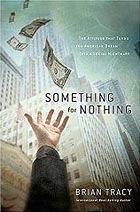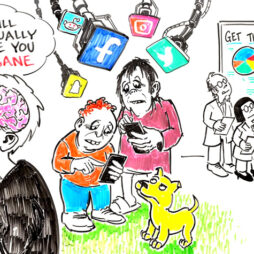The All-Consuming Desire that Turns the American Dream into a Social Nightmare.

Brian Tracy’s book, Something for Nothing, is an honest and critical look at many of the societal and cultural problems our society is facing. Tracy is
most concerned with the natural tendencies and drives of our human nature, how they have been misdirected and abused, and how, as a result, they have contributed to creating and perpetuating those social and cultural
problems. Driven by his desire to understand and explain human behavior, the author relies on his experiences and insights to present a comprehensive and clear picture of how humanity’s misguided approaches in actualizing our desires to get “something for nothing” have brought about many unintended and dreadful consequences to not only individuals themselves but our society in general.
Tracy attributes many of the insights he presents in the book to the realization he had years ago that “everyone is lazy, greedy, ambitious, selfish, vain, impatient, and ignorant, only for different things and in different ways.” He elaborates further that these qualities “are as normal and as natural as breathing in and breathing out” and form the basis of the Expediency Factor, which explains why “people continually strive to get the things they want the fastest and easiest way possible, with little or no concern for the secondary consequences of their behaviors.” Channeled through productive and meaningful endeavors, fueled by hard work and risk taking, these human traits help foster innovation and entrepreneurship that create value, increase productivity, bring prosperity, and make the world better for everyone. Left unchecked and abused, these same qualities can also turn people into envious, greedy, lazy, and abusive individuals who constantly look for a free ride and expect to “get something for nothing”, often at the expense of the hard work and efforts of others.
Capitalistic societies grounded in the principles of freedom, free enterprise, personal accountability, law and order are truly the best hope for individuals looking for a better life, personal success and achievement. “Productive individuals and businesses produce all wealth. Successful business activities ultimately provide all jobs,” Tracy observes. This is indeed a universal truth that applies to all people and is available to all societies: “throughout the world, whenever freedom and the free market have been introduced, especially in poor nations, they have achieved astonishing results.” … “Throughout history, virtually every society that has reduced taxes and regulation and encouraged entrepreneurship, thereby making it expedient for people to save, invest, and produce, has prospered, sometimes overnight.”
What stands in the way of freedom, accountability, success, and prosperity on both a personal and a societal level, is either excessive government control, taxation and regulation, or the abuse and misdirection of our own natural desires towards undesirable tendencies. Too many people expect to succeed by doing the least amount of work possible and trying to get something for free. Instead of focusing on being more disciplined, hard working, productive, entrepreneurial, and continually thinking in the long term, these individuals are always focused on short-term satisfaction and look for shortcuts, many times at the expense of others.
Tracy eloquently summarizes an important and universal truth: “Nothing comes from nothing. In our material world, something must be produced before it can be consumed. Everything comes from something. This means that if someone consumes without producing, someone else must produce without consuming.” Unfortunately too many people in our society have been conditioned, by government programs, welfare policies, socialist politicians and other communist demagogues, to expect and demand that free money and free social services of all kinds are their birthright. The consequences can be devastating. “Free money is destructive. Once a person begins to receive it on a regular basis, his self-respect, self-esteem, dignity, and self-reliance go down the drain. He becomes weak and grasping. He loses all sense of personal pride and independence.”
History has shown that as prosperity has continued to increase in America, “well-meaning people, dreamers, and utopians, with no understanding of entrepreneurship, productivity, capital flows, or competition, began to think in terms of “sharing” this newly created wealth.” The tragedy of so many “something for nothing” policies and programs is that it has forced the United States to slowly move away from its core ideals of freedom and opportunity for everyone. Our country has drifted further and further away from the critical values of personal responsibility and individualism and its moving faster and faster towards a culture suffocated by failed communist policies and thinking that promote increased dependency on government largesse, discourage personal accountability, responsibility, and success; and they continually expand the oppression of individual achievement and punishment of personal success, via excessive regulation and taxation.
Using the communist mantra of “punish the rich” this anti-capitalistic environment is continually being perpetuated and expanded by many “politicians [who] get elected by offering some variation of something for nothing that will benefit their supporters. This is most common in the left wing, Democratic, socialistic parties, the members of which are mostly convinced that anyone who is successful deserves to have their money taxed away from them for the benefit of others.” In reality any subjective redistribution scheme to transfer wealth from those that create it to those that want it, based on arbitrary rules created by politicians is nothing more than another form of theft: “taking money away from those who have earned it to give to those who have not earned it, is a form of stealing.”
Tracy’s motivational speaker style is evident throughout the book and serves to both re-enforce key concepts and also to focus the reader’s attention on important truths and strategies for personal and societal success. “Successful people are hungry. They have an intense desire to be more, do more, and have more than they have ever had before. They want to improve their lives and they recognize that, your life only gets better when you get better. They are ambitious, in a healthy, helpful way… successful, happy people are willing to make the necessary sacrifices each day, and throughout their lives, to enjoy greater rewards and benefits at a later time. They are willing to pay the price of success over and over again until they attain it,” writes Tracy. “The major difference between successful people and failures was that successful people make a habit of doing what unsuccessful people don’t like to do.” And what are those things? The answer is surprisingly simple, “the same things successful people didn’t like to do either.” .. “But successful people disciplined themselves to do them anyway – getting up earlier, working harder, and staying up later – because successful people realized that these were the prices one had to pay to rise above the average.”
Overall the book does an excellent job of summarizing Tracy’s philosophy of life, his insights into human behaviors and motivations, and the societal crisis and dangers we’re all facing because of so many misguided policies and trends. The many important insights and reasonable solutions offered could be a benefit both to individuals and to societies.

